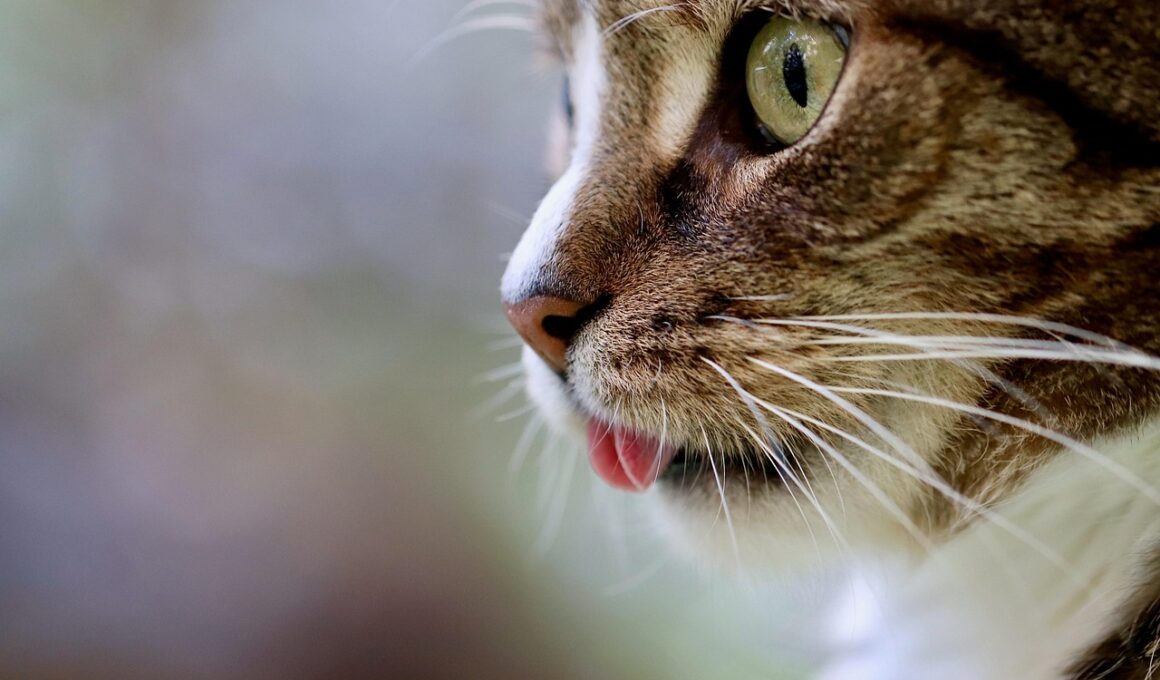How to Document Your Senior Cat’s Medical History for Travel
Preparing to travel with your senior cat involves essential documentation, especially regarding their medical history. Begin by creating a comprehensive folder containing all health-related documents. This should include vaccination records, recent vet visit notes, and any medications prescribed. Ensure that the information is current and reflects any recent treatments or health check-ups. Consider organizing the documents chronologically, making it easier for research. If your cat has chronic conditions, note specific symptoms or changes in behavior. It’s also beneficial to obtain a health certificate from your veterinarian, as many accommodations and transport services require proof of good health. Additionally, assess any specific needs your cat may have, such as dietary restrictions or mobility issues. Having access to their medical history is crucial should your cat require care while traveling. You might also want to provide contact information for your veterinarian in case of emergencies. The purpose of this documentation is to ensure your senior cat receives the best care possible during your travels, enhancing their comfort and safety.
Before embarking on your journey, it’s vital to prepare a detailed itinerary that includes access to veterinary services. Research veterinarians along your travel route, noting their contact details and locations. Create a list of emergency clinics in case of unforeseen health issues. It is advisable to select pet-friendly accommodations that are familiar with senior cats’ needs. Some hotels and alienation services may require proof of vaccinations, so keep these documents handy. Additionally, keep a record of your senior cat’s medication schedule, including dosages and administration times. Consider bringing a travel diary for your cat, where you can note any observations about changes in behavior or health during the trip. These notes can be extremely helpful for your veterinarian consultations. If your cat has trouble adjusting to new environments or exhibits anxiety, this documentation will aid in understanding their patterns. Ultimately, a well-planned itinerary aligns your travel goals with your beloved cat’s health needs, ensuring a pleasurable experience for both of you.
To further ensure a smooth journey, prepare your senior cat by scheduling a comprehensive health exam with a veterinarian. Discuss any specific travel concerns you may have, especially those regarding your cat’s age and health status. Your veterinarian may have valuable insights or suggestions, including any necessary vaccinations or preventative treatments that may be required in certain areas. Inquire about the best ways to manage your cat’s stress levels during travel, as older cats may be especially sensitive to changes in their environment. Your vet might recommend calming products or medications, which can help alleviate anxiety. Additionally, inquire about feeding schedules during travel. Senior cats often have unique dietary needs; ensure that you bring the right food and consider discussing how to maintain their routine while on the road. Establishing a familiar routine can help reduce stress, making your trip more enjoyable for both you and your feline companion. The responsibility of ensuring a healthy journey lies with you, making it essential to utilize your veterinarian’s expertise effectively.
Creating a Travel-Friendly Environment
While traveling, it’s key to make your senior cat comfortable. Bring familiar items such as toys, blankets, and beds to help recreate a home-like atmosphere. A sense of familiarity can greatly reduce anxiety as they adjust to new surroundings. Prioritize safety by utilizing a pet carrier, ensuring it’s adequately secured and comfortable. Allow your cat to explore their carrier prior to the trip, developing a sense of security. Additionally, ensure proper ventilation within the carrier to promote a comfortable environment. Research the regulations regarding pet travel in your destination area, as some places might have specific guidelines or restrictions, especially concerning local wildlife. During breaks, allow your senior cat time to stretch and move around safely. This time can be used to hydrate and offer small portions of food. Remember to maintain a relaxed demeanor throughout the journey; cats often mirror their owners’ emotions, so a calm presence can ease their travel anxiety. An accommodating travel environment is essential for ensuring your senior pet’s enjoyment and peace of mind.
It’s essential to keep an eye on your senior cat’s behavior during your travels. Watch for signs of distress or discomfort, which are common in older pets away from home. Frequent grooming can help in bonding and monitoring their health; some cats may exhibit changes in their coat or weight during travel. In addition to visual observations, it’s wise to document any shifts in behavior or appetite. This information can prove invaluable in understanding your cat’s needs. To maximize comfort, schedule regular breaks during your trip and offer your cat an opportunity to hydrate and snack. These breaks allow both of you to analyze any troubling behaviors and adjust if needed. If anxiety seems evident, consider using calming treats or sprays specifically designed for cats. Engaging them with soothing voices or gentle strokes can also alleviate fears during stressful moments. Keeping a close watch will ensure that your senior cat remains as happy and healthy as possible throughout your travel experience. The focus remains on ensuring that their needs are met efficiently.
Emergency Preparedness for Senior Cats
No matter how careful you are, accidents can happen. Be prepared for emergencies while traveling with your senior cat. Ensure you have a first aid kit specifically for pets, including items such as bandages, antiseptic wipes, and any medications your cat needs. Familiarize yourself with basic first aid procedures; knowing how to act in case of injury can save your cat’s life. You may also consider keeping extra copies of medical records and vaccination documents handy, in case of incidents that require veterinary attention. Keep both your regular vet’s and nearby emergency clinic contact numbers easily accessible. Another essential part of planning is ensuring that your cat is properly tagged and microchipped for identification. This could prove invaluable in the event of separation. Be proactive: familiarize yourself with the signs of common illnesses in senior cats so you can act quickly if health issues arise. Ensuring you are well-equipped and informed will contribute significantly to a safe and enjoyable travel experience for both you and your beloved feline.
In conclusion, traveling with a senior cat necessitates thorough preparation, careful planning, and attentiveness to ensure their comfort and safety. Familiarize yourself with your cat’s specific health needs and preferences before embarking on your journey. Document and organize all medical information, so it’s accessible during travel. Consider consulting with your veterinarian for best travel practices. Create a travel-friendly environment, bringing along familiar items that maintain a sense of home for your pet. Keep your cat’s health under close observation during the trip, noting any anxiety or discomfort. Establish a plan for emergencies, ensuring you have essential items and contacts readily available. Take all precautions to enjoy a stress-free travel experience while prioritizing your cat’s comfort. With mindful planning and adequate precautions, you can create cherished memories while exploring the world together with your senior feline companion. Prioritize health and happiness above all; your cat’s well-being is paramount. Happy travels await you and your beloved senior cat!
This article also emphasizes the importance of planning for potential accommodations. Pet-friendly hotels often cater to unique needs for senior cats, paving the way for a smoother experience.


